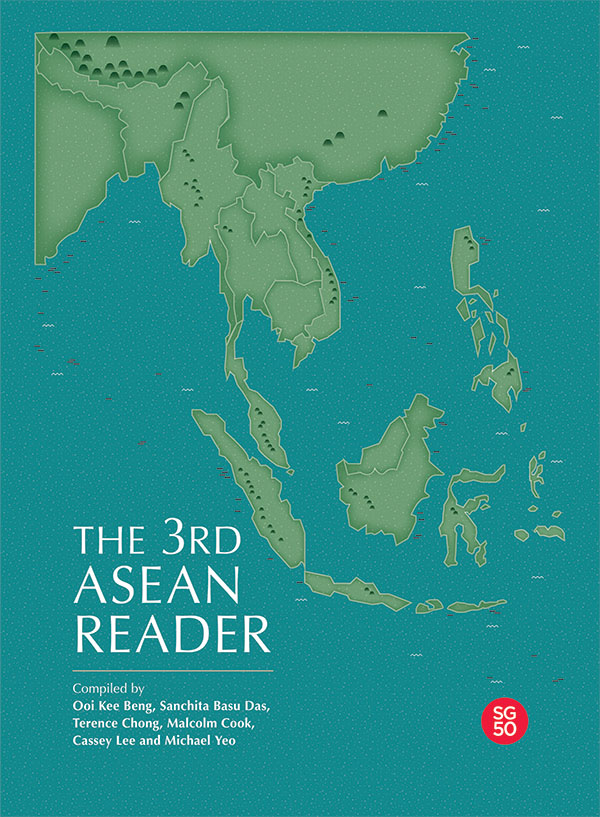Book contents
- Frontmatter
- Contents
- Preface
- Forewords to the First and Second ASEAN Reader: ASEAN: Conception and Evolution
- Forewords to the First and Second ASEAN Reader: ASEAN: The Way Ahead
- Forewords to the First and Second ASEAN Reader: New Challenges for ASEAN
- SECTION I ASEAN: THE LONG VIEW
- SECTION II COUNTRY ANALYSES
- SECTION III COMPARATIVE ANALYSES OF THE REGION
- Southeast Asian Societies
- The Southeast Asian Economy
- Southeast Asian Politics
- SECTION IV INTERNATIONAL DEVELOPMENTS
- SECTION V INSTITUTIONS OF ASEAN
- SECTION VI ASSESSING ASEAN'S INTERNAL POLICIES
- ASEAN Political Security Community
- ASEAN Economic Community
- 41 Implementing the ASEAN Economic Community Blueprint
- 42 Towards an ASEAN Economic Community by 2015
- 43 Understanding ASEAN's Connectivity
- 44 Enhancing the Institutional Framework for AEC Implementation
- 45 What is a Single Market? An Application to the Case of ASEAN
- 46 Non-Tariff Barriers: A Challenge to Achieving the ASEAN Economic Community
- 47 Towards a Truly Seamless Single Windows and Trade Facilitation Regime in ASEAN Beyond 2015
- 48 An Assessment of Services Sector Liberalization in ASEAN
- 49 Financial Integration Challenges in ASEAN beyond 2015
- 50 Free Flow of Skilled Labour in ASEAN
- 51 Toward a Single Aviation Market in ASEAN: Regulatory Reform and Industry Challenges
- ASEAN Socio-Cultural Community
- SECTION VII ASSESSING ASEAN'S EXTERNAL INITIATIVES
- ASEAN Processes
- ASEAN's Major Power Relations
- SECTION VIII SOUTHEAST ASIA: PERIPHERAL NO MORE
- Bibliography
- The Contributors
- The Compilers
46 - Non-Tariff Barriers: A Challenge to Achieving the ASEAN Economic Community
from ASEAN Economic Community
Published online by Cambridge University Press: 22 June 2017
- Frontmatter
- Contents
- Preface
- Forewords to the First and Second ASEAN Reader: ASEAN: Conception and Evolution
- Forewords to the First and Second ASEAN Reader: ASEAN: The Way Ahead
- Forewords to the First and Second ASEAN Reader: New Challenges for ASEAN
- SECTION I ASEAN: THE LONG VIEW
- SECTION II COUNTRY ANALYSES
- SECTION III COMPARATIVE ANALYSES OF THE REGION
- Southeast Asian Societies
- The Southeast Asian Economy
- Southeast Asian Politics
- SECTION IV INTERNATIONAL DEVELOPMENTS
- SECTION V INSTITUTIONS OF ASEAN
- SECTION VI ASSESSING ASEAN'S INTERNAL POLICIES
- ASEAN Political Security Community
- ASEAN Economic Community
- 41 Implementing the ASEAN Economic Community Blueprint
- 42 Towards an ASEAN Economic Community by 2015
- 43 Understanding ASEAN's Connectivity
- 44 Enhancing the Institutional Framework for AEC Implementation
- 45 What is a Single Market? An Application to the Case of ASEAN
- 46 Non-Tariff Barriers: A Challenge to Achieving the ASEAN Economic Community
- 47 Towards a Truly Seamless Single Windows and Trade Facilitation Regime in ASEAN Beyond 2015
- 48 An Assessment of Services Sector Liberalization in ASEAN
- 49 Financial Integration Challenges in ASEAN beyond 2015
- 50 Free Flow of Skilled Labour in ASEAN
- 51 Toward a Single Aviation Market in ASEAN: Regulatory Reform and Industry Challenges
- ASEAN Socio-Cultural Community
- SECTION VII ASSESSING ASEAN'S EXTERNAL INITIATIVES
- ASEAN Processes
- ASEAN's Major Power Relations
- SECTION VIII SOUTHEAST ASIA: PERIPHERAL NO MORE
- Bibliography
- The Contributors
- The Compilers
Summary
INTRODUCTION
A significant milestone of economic integration in the ASEAN region is the substantial progress in tariff liberalization. The achievement in tariff reduction, however, has been marred by non-tariff barriers (NTBs). First, they have replaced tariffs as protective measures for domestic industries (World Bank 2008). Second, the bulk of intra-regional trade transactions among the ASEAN economies is driven by the global production networks of multinational companies in the region. Efficiency in moving goods across borders has thus become crucial in capturing and creating trade opportunities arising from the vertical and horizontal operations of these networks (Austria 2004). Third, behind-the-border interventions have increasingly emerged as the new form of protectionism since the recent global economic crisis (Wermelinger 2011).
NON-TARIFF BARRIERS AND MEASURES: DEFINITION AND CONCEPTUAL ISSUES
Broadly defined, non-tariff measures (NTMs) refer to any measure, other than tariffs, that distorts trade. In general, distortions include border and behind-the-border measures that arise from government regulatory policies, procedures and administrative requirements which are imposed to serve a particular purpose.
While the pursuit of domestic policy objectives is legitimate, NTMs have the potential to become NTBs. This could arise when such measures specifically discriminate against imports or foreign firms; when they are imposed explicitly to protect domestic industry; when they are not applied uniformly among trading partners; or, when they include unjustified and/or improper application of sanitary and phytosanitary (SPS) measures and other technical barriers to trade.
ASEAN INITIATIVES TO ADDRESS NTMS AND NTBS
The commitment to eventually phase out or eliminate NTBs in the region has always been an integral part of the trade liberalization program.
Starting in 2004, The High Level Task Force (HLTF) on ASEAN Economic Integration outlined specific recommendations with regards to NTMs:
a. Establish ASEAN Database of NTMs by mid-2004;
b. Set clear criteria to identify measures that are classified as barriers to trade by mid-2005;
c. Set a clear definitive work program for the removal of the barriers by 2005; and
d. Adopt the WTO agreements on Technical Barriers to Trade and on Sanitary and Phytosanitary and Import Licensing Procedures and develop implementation guidelines appropriate for ASEAN by the end of 2004.
- Type
- Chapter
- Information
- The 3rd ASEAN Reader , pp. 241 - 245Publisher: ISEAS–Yusof Ishak InstitutePrint publication year: 2015



